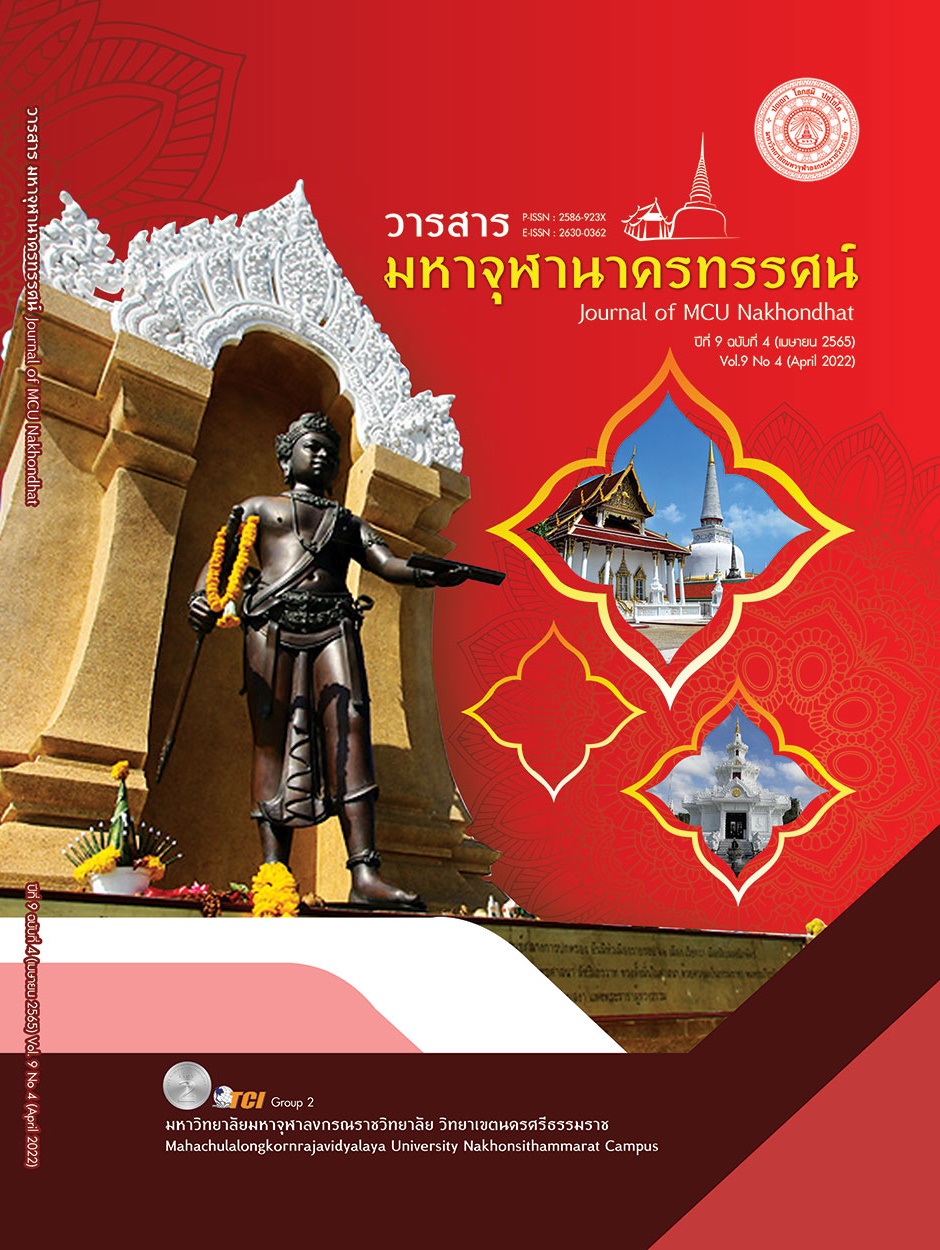EVALUATION OF HYGIENE STANDARDS OF COMMUNITY-BASED TOURISM ENTERPRISES IN SAMUT SONGKHRAM PROVINCE
Main Article Content
Abstract
The purpose of this research paper was to study the hygiene behavior of Community -based tourism (CBT) enterprises and the evaluation of hygiene standards of CBT enterprises in Samut Songkhram Province. This research was conducted using a mixed research methodology. It consists of quantitative research and qualitative research. The research tool was a questionnaire. and interview form. The sample group used in this research study obtained from tourism operators, community-based tourism enterprise entrepreneurs in Samut Songkhram Province and operators in community enterprise tourism establishments and stakeholders were 400 people and in-depth interviews from 20 community-based tourism enterprises in Samut Songkhram Province. The statistics used in the data analysis were frequency, percentage, mean, standard deviation. Analysis using packaged programs. The results showed that 1) The behavior of the respondent mostly female accounted for 53.75%, aged between 41-50 years representing 40.0%, marital status representing 52.50%, educational level at the bachelor's degree level accounted for 69.0%, entrepreneurial career accounted for 35.50% with monthly income of 20,001 - 30,000 baht or 48.50%. 2) The level of opinion about the hygiene of Community -based tourism (CBT) enterprises. It was found that overall level, was at the highest level. There is a limit on the number of service recipients. arrange waiting area and must have a distance between people of at least 1 meter first, accounting for 96.50%, followed by allowing only service recipients who wear cloth masks or hygienic masks to use the service only accounted for 93.75% and provide a one-way entrance and exit for service recipients accounted for 92.50%. 3) Evaluation of hygiene standards of community-based tourism enterprises In Samut Songkhram Province. This value is a high level.
Article Details

This work is licensed under a Creative Commons Attribution-NonCommercial-NoDerivatives 4.0 International License.
References
กรมอนามัย กระทรวงสาธารณสุข. (2563). คู่มือการปฏิบัติตามมาตรการผ่อนปรนกิจการและกิจกรรมด้านการท่องเที่ยวเพื่อป้องกันการแพร่ระบาดของโรคติดเชื้อไวรัสโคโรน่า 2019(COVID-19) แนวทางปฏิบัติสำหรับเจ้าของกิจการ/ผู้ให้บริการ/ผู้ใช้บริการ. เรียกใช้เมื่อ 20 สิงหาคม 2564 จาก https://drive.google.com/file/d/1I5zqUv fFwNyAaO6L10LqgJagAolSeCI/view
การท่องเที่ยวแห่งประเทศไทย. (2563). แผนวิสาหกิจการท่องเที่ยวแห่งประเทศไทย พ.ศ. 2560-2564 (ฉบับทบทวน พ.ศ. 2562-2564). เรียกใช้เมื่อ 20 สิงหาคม 2564 จาก https://www.thai-german-cooperation.info/admin/uploads/publication/ 1be798cb24ee07703c498fcd47cbba4den.pdf
วีระพล ทองมา. (2560). การท่องเที่ยวโดยชุมชน (Community Based Tourism :CBT) สำหรับการพัฒนาคุณภาพชีวิตของชุมชนในเขตที่ดินป่าไม้. เรียกใช้เมื่อ 25 กรกฎาคม 2564 จาก www.dnp.go.th/fca16/file/i49xy4ghqzsh3j1.doc
สำนักงานสถิติจังหวัดสมุทรสงคราม. (2563). สำรวจที่พักโรงแรม, พ.ศ.2563. เรียกใช้เมื่อ 25 กรกฎาคม 2564 จาก http://samutsongkhram.nso.go.th/index.php/2011-10-11-03-04-36/1001-05112563
สำนักงานสภาพัฒนาการเศรษฐกิจและสังคมแห่งชาติ. (2561). แผนพัฒนาเศรษฐกิจและสังคมแห่งชาติฉบับที่ 12. เรียกใช้เมื่อ 20 กรกฎาคม 2564 จาก https://www.nesdc.go.th /main.php?filename=develop_issue
สำนักท่องเที่ยวโดยชุมชน. (2561). กระบวนการพัฒนาการท่องเที่ยวชุมชนอย่างยั่งยืน. เรียกใช้เมื่อ 20 กรกฎาคม 2564 จาก https://cbtthailand.dasta.or.th/webapp
Creswell, J. W. (2013). Qualitative inquiry and research design: Choosing among five approaches. (3 ed.). California: SAGE.
Cronbach, L. J. (1970). Essentials of Psychological Testing. New York: Harper & Row.
Hair J.F. et al. (2006). Multivariate data analysis. (6th ed.). New Jersey: Pearson Prentice Hall.
Vidich, A. J., & Lyman, S. M. (2000). Qualitative methods: Their history in sociology and anthropology. In N. K. Denzin & Y. S. Lincoln (Eds.), Handbook of qualitative research. (2nd ed.) California: SAGE.
Vos, M. C. et al. (2019). Measuring perceived cleanliness in service environments: Scale development and validation. International journal of hospitality management, 83(2019), 11-18.
Yu, j. et al. (2021). Perceived hygiene attributes in the hotel industry: customer retention amid the COVID-19 crisis. International Journal of Hospitality Management, 93(2021), 102768.


